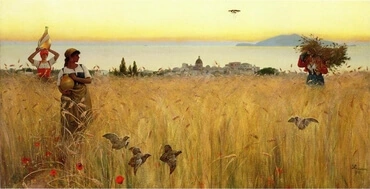
Uses are the tangible, expressed forms of love to the neighbor. We can think of things we might do to help a neighbor, and we can want to do something to help, but it’s not until we deploy the thoughts and act on our will, that we actually perform a use.
Doing actual useful service completes the trilogy of end, cause, and effect -- the action being the effect. Further, the primary theater for charity is not the giving of alms to various people or causes, though that is important, but to do our job "honestly, rightly, justly and faithfully" (as it says, in "Divine Love and Wisdom" n. 431), as best we can, not because it helps us but because it helps the common good. And because this is what the Lord requires of us.
Heaven is called a kingdom of uses because all angels are busy doing useful tasks every day, and angels love it so, because these tasks are perfectly suited to the angel doing them, allowing each person to delight in what he is doing every day to his or her heart’s content. (See Heaven and Hell 403.)
One of the key descriptions of heaven in the doctrines is that of a single grand human being, not because of shape but because of function. Modern science has learned a lot about the human body. We can know that we are made up of billions of different kinds of cells, brain cells, muscle cells, bone cells, and on and on, and that all these cells are busy little shops, taking in raw materials from the blood and turning out products the body needs and sending them around. We can see that each cell in our body is analogous to a society of angels, as we are told that there are societies in the provinces of all parts of the body performing the spiritual correspondent of what the various body parts do in an anatomic or physiologic way. So just as our cells all perform uses in our body to keep the whole body healthy and active, so do all angelic societies, and within those individual angels. Thus heaven can continue to exist, grow and perform its uses toward those of us still down here in the material world.
A similar kind of picture, though in a more imperfect way, shows how a political entity, a country, or state, or city can operate with all the various jobs contributing to a vibrant commonwealth, with people trading goods and services and doing all the things that make a community live. But it works better when all the citizens are led internally by love to the neighbor rather than love of self.
(References: Arcana Coelestia 454, 997, 4222, 4984, 7038; Divine Love and Wisdom 65, 213, 297; Heaven and Hell 64, 387, 403, 517 [2])






